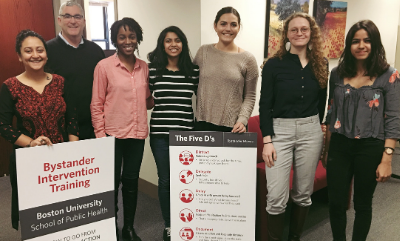Why Bystander Intervention Training?
 Everyday discrimination is a public health problem. When people are harassed in public because of how they look, who they love, or how they worship, the trauma is felt deeply for a long time. Institutional mistreatment by government or commercial entities serves to inflame these feelings. It’s no wonder that health professionals can measure the effects of everyday discrimination in people’s blood pressure and birth outcomes.
Everyday discrimination is a public health problem. When people are harassed in public because of how they look, who they love, or how they worship, the trauma is felt deeply for a long time. Institutional mistreatment by government or commercial entities serves to inflame these feelings. It’s no wonder that health professionals can measure the effects of everyday discrimination in people’s blood pressure and birth outcomes.
People may witness everyday discrimination but feel unprepared to intervene. MPH students at Boston University School of Public Health are trained to intervene when witnessing public harassment. Starting in the Fall 2018 semester, MPH students participate in an intensive workshop through their Leadership and Management class to learn techniques of Bystander Intervention that prepare them to move from inaction to action in the face of public harassment.
Some faculty, staff, and students who participate in the Bystander Training are motivated to carry on the training beyond the bounds of the school campus. Fulfilling the mission of the School of Public Health to improve the health of vulnerable populations in the world beyond the boundaries of the campus, this team has been organizing trainings for community groups in suburbs surrounding Boston. More than 100 people have been trained in bystander intervention techniques at events organized by community groups and religious institutions including the Wellesley Democratic Town Committee, Christ Lutheran Church in Natick, Temple Beth Shalom in Needham, Needham First Parish Church, and North Hill of Needham.